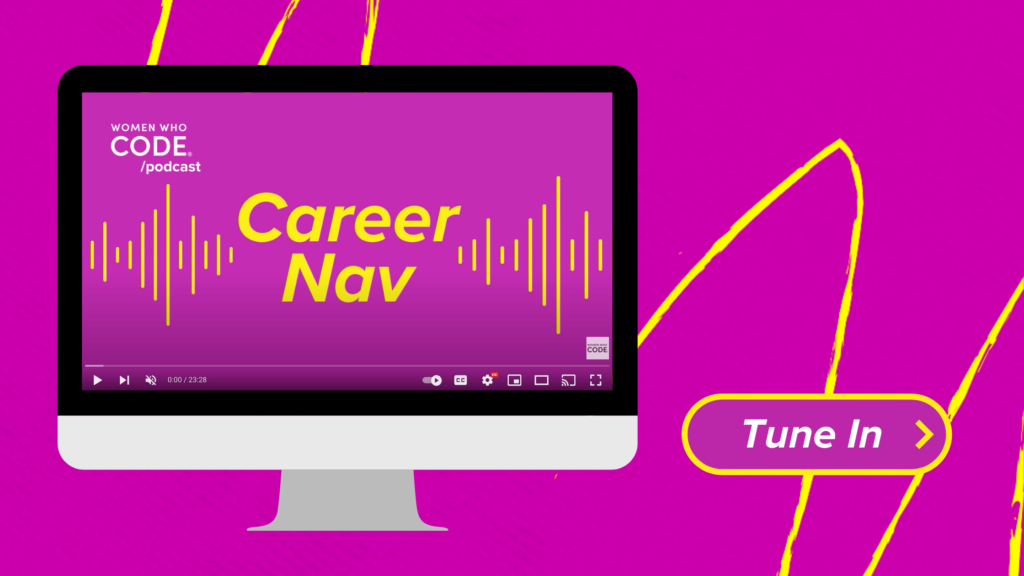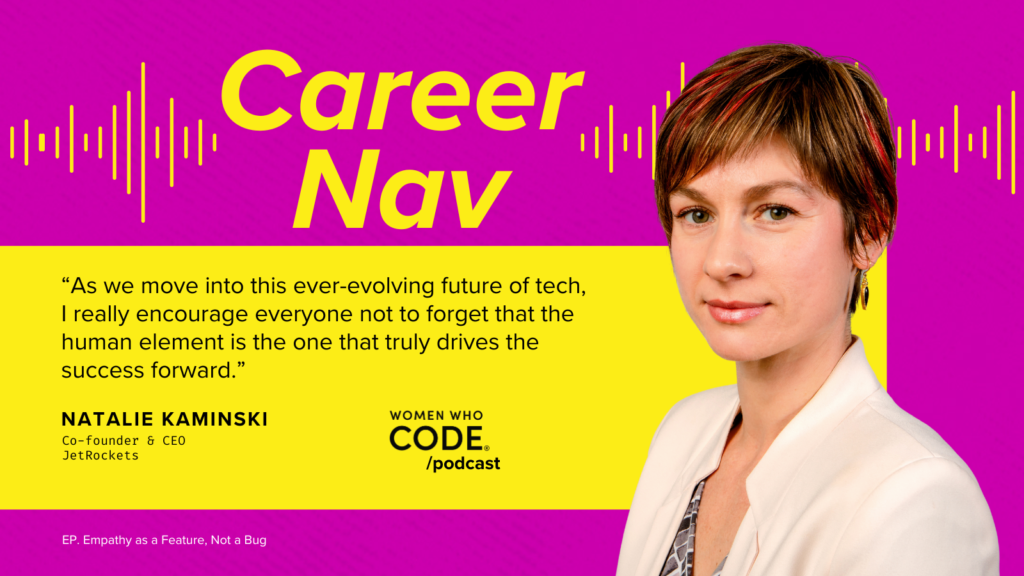Career Nav #84: Empathy as a Feature, Not a Bug
Written by Natalie Kaminski
This article has been adapted from the audio recording of Career Nav #84.

Natalie Kaminski, Founder and CEO at JetRockets, shares her transition from a strongman leadership approach to an empathic one. She talks about the benefits of empathy and shares moving the entire company, including employees, in order to support her values.
I started my career back in 1998 before women in tech was a topic of discussion. There was very little room for empathy during those times. I had to be very aggressive and straightforward and stand my ground. There was no room for work-life balance, understanding, or all those emotional things that we value today as leaders. I’ve pivoted my approach to leadership during these years and have come to believe that empathy is the most important feature of a leader. Starting out in tech as a woman back in 98, I quickly learned that showing empathy was often perceived as a weakness. I had to be rough, tough, assertive, and incredibly persuasive to get my point across. When I moved on to managerial roles, I took that strongman leadership approach with me on my journey. I focused primarily on getting the project done on time and budget and getting to this next promotion, climbing the corporate ladder.
When I decided to launch my own business in 2014, I took the same strongman leadership approach into my new era, and it worked for quite some time. We grew, and we have a team of very dedicated developers. They’d get the work done on time and on budget, and we got it done. We said goodbye and moved on to the next project. That was the approach. It worked; we made money and grew when we became profitable and successful. As the team grew, so did my responsibilities. I took pride in running a lean and agile firm. We didn’t have room for middle management because we never believed in middle management, and frankly, I still don’t. That meant, as the CEO of the company, I had a lot of added responsibility. I was responsible for billing, generating new sales, managing accounts, and managing projects. There were times when there were simply not enough hours in the day to get all of my work done, do it effectively, and be as good.
My partners and I started to look into alternatives. How can we run our business in such a way that the leadership can work on the business as opposed to in the business? How can we build a team that promotes and pushes itself forward and does not require a lot of control and management? We came across an incredible book that changed the whole trajectory of my approach to leadership. The book is called Reinventing Organizations, and Frederic Laloux wrote it. This book tells a story of what it means to develop a Teal organizational structure. Teal organization means self-management, accountability, and value-driven culture. It’s about empowering teams, embracing everyone’s strengths and weaknesses, and living by a set of core values that everyone in the company agrees with. It’s a long read, but it’s fascinating. We decided why not try to implement it at JetRockets.
It turned into a humongous challenge because not only did we have to change ourselves as the organization’s leaders, but we also had to instill new values and approaches into our teammates. It was really about moving from command and control to connect and empower. Rolling out these new Teal principles took work. We faced some resistance, a lot of skepticism, and overall challenges to change management. It required consistent effort, but more importantly, it was a shift in the mindset. On the one hand, the new management structure provided a lot more freedom and flexibility to our employees. On the other hand, it also required us to instill this culture of increased accountability and self-discipline, which was not a simple task. At the same time, I had to change myself by learning to delegate and trust my team to do the right thing. The delegation process did not come naturally to me.
There were so many times when I felt like I had to hold myself back and not get involved in certain situations, putting out fires or just putting in my two cents. I had to allow my employees to handle it. By shifting towards self-management, we really learned to empower our team to take greater ownership of their work, leading to increased job satisfaction and motivation, and our bottom line got a lot stronger. This autonomy also sparked a lot of creativity. Our team meetings used to be largely directive.

We now encourage team members to voice their ideas and concerns. Transparency is one of our core values at JetRockets. Empathy also plays a crucial role at JetRockets in recognizing the diverse personal commitments of our employees. We had a situation when one of our developers was going through a very personal family crisis. Instead of pressuring them to meet deadlines while still doing the job and being responsible, we offered flexible working hours and additional support. It ultimately created one of the most loyal employees within our organization.
We’ve also started implementing personalized development plans for each team member, taking into account their individual desires and interests. Driving professional growth and innovation ultimately contributes to the overall success of our company.
Empathy provides vital solutions to any interpersonal conflicts. It has affected every single step of our business and really allowed us to become a stronger team. Our interactions with our clients have also improved dramatically. Not only did we learn to work with non-tech founders, which later and now became our core niche, but instead of just focusing on delivering the product, our team took extra time to guide our clients through the process, educating them along the way. We develop a long-term relationship that translates not just to increased work, dedication, and loyalty on both ends but also develops interpersonal ties that transform the way the business every single day.
The biggest challenge to our empathy-driven approach came in February of 2022 when Russia invaded Ukraine. A large portion of my developers at the time resided in Russia. While we never did any business in Russia, we did have a development center and paid salaries to people who resided in Russia. Within a few days of the beginning of that invasion, I made a decision to shut down any operation in Russia and relocate all of our employees to neighboring Georgia.
I couldn’t bear the thought that our money was contributing to the war chests of Russia by way of taxes. This was a non-negotiable decision. The process was far from easy. It would have been easier to part ways with all of my Russian-based employees and hire a whole bunch of new people. It definitely would have been a more economical solution, but that is not something that I could make myself do. These people have been with the JetRockets, many of them for five, six, or seven years. They have directly contributed to the success and growth of the firm. They’ve developed a very close relationship with our clients and with one another. The idea of abandoning them and just saying your country is committing war crimes, and we no longer want to deal with you was simply not an option.
Over the course of several months, I took on a lot of extra responsibilities as the leader of this organization. I felt a personal responsibility to everyone willing to come with us, leave their lives behind, move, and start anew.
One of the things that we’ve done as part of this allocation is to shut down our office space in Russia and open a new office space in Georgia, in Batumi. Being in the industry we’re in, we can completely work remotely. We don’t have to have this extra added expense of an office space, but to me, it felt like having a place for gathering. These people just abandoned their entire lives and moved to this new country. They knew one another, but that’s about it. Their entire social circle has been cut significantly. By opening a new office space and making it seem cozy and inviting, we created this place where people could come and feel worthwhile.
It’s been nearly two years now, since we’ve relocated to Georgia. We’ve had some turnover; some people who came with us moved on to other companies. That’s just the nature of the game, but a lot of people still work with us. Our oldest employee, who’s been with us for 10-plus years, is still employed at JetRockets. There must be something we are doing right. During these two years, we’ve also focused on hiring Ukrainians, who lost their jobs as a result of the war, an opportunity to get back into the industry. We have become a stronger organization that has demonstrated our loyalty to its employees.
Over 20 years of experience, I have seen both sides of the coin. I’ve had the strongman leadership approach. Now, over the course of the past five or six years, I’ve really adopted the empathetic approach to leadership. I want to instill a hard work ethic into my team members and see them as human beings with specific needs. I truly believe that this is a strength. It’s a strength that can truly drive a company forward. It’s about balancing leadership with understanding and compassion.